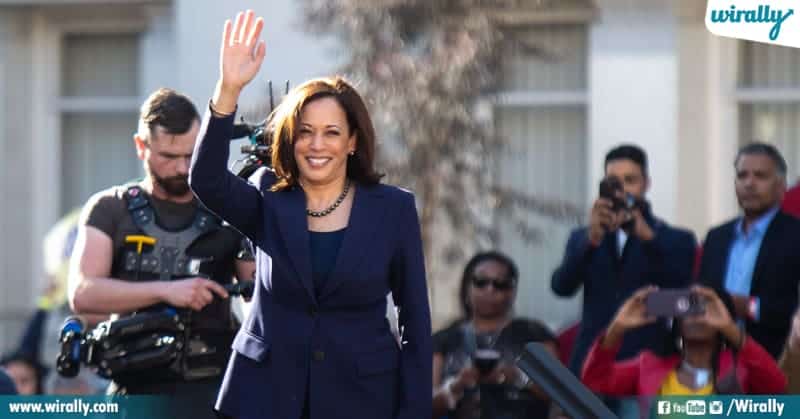Kamala Harris, in full Kamala Devi Harris, was recently elected as United States Vice President, becoming the first Female Vice President in US Presidential History. November 7th , the day the election results were announced, marked a great day for all women, especially those of colour, because Kamala Harris proved that any women of colour can come into power. She herself is a black woman of South Asian descent which made all Black and Indian people proud.
But it sure takes a lot of struggle and challenges to reach to this level of power. What was her life story? Kamala Harris was born on October 20, 1964 in Oakland, California, U.S. Harris was born to two immigrant parents: a Black father and an Indian mother. Her father, Donald Harris, was from Jamaica, and her mother, Shyamala Gopalan, a cancer researcher and civil rights activist from Chennai. She, however, defines herself simply as ‘American’.
While living in Montreal, Kamala learned French and even started a dance team at her high school. After graduating, Harris moved back to the U.S. where she pursued a degree in political science and economics at Howard University, one of the longest standing Historically Black Colleges and Universities in the country. After which she earned a law degree in 1989 from Hastings College.
She worked as a deputy district attorney from 1990 to 1998 in Oakland, earning a reputation for toughness as she prosecuted cases of gang violence, drug trafficking, and sexual abuse.

“My mother understood very well that she was raising two black daughters,” she wrote in her autobiography The Truths We Hold.” She also claimed that she knew that her adopted homeland would see Maya and me as black girls and she was determined to make sure that she and her sister would grow into confident, proud black women. Before Harris was born, her mother had immigrated to the U.S. from India to attend the University of California, Berkeley (UC Berkeley) where she obtained both a master’s and doctorate degree, and went on to have a career as a biomedical scientist.
Her father, who had immigrated from Jamaica to also study at UC Berkeley, was an economics professor at Stanford University. While Harris has said that her parents met during the civil rights movement and would frequently take their young daughters to civil rights marches, as a multi-racial American and the child of two immigrant parents, Harris learned at a young age that the country she called home was not always friendly to its citizens of colour.
In interview with the Los Angeles Times, Harris recalled visiting her father in Palo Alto after her parents divorced and being told by a neighbourhood child that she was forbidden from playing with Harris and her younger sister, Maya, because they were Black. While in elementary school she was bussed to an almost entirely white school in a different district as part of a federal attempt to desegregate schools, something Harris has said made her feel like an outsider.
Kamala has faced many controversies pertaining to her choices made u her career for which she has been criticised to the most. Even though Harris has consistently faced criticism for prosecuting people under the three strikes law, she has defended her actions several times. During a radio interview with The Breakfast Club, for instance, the vice president-elect said that she “would never apologize for saying that when a child is molested or a woman is raped or a human being kills another human being that there should be serious consequences for that.”
She couldn’t be more right! In 2003, Harris ran and won against her former boss to become San Francisco’s district attorney, making her the first person of colour ever elected to that position.
Harris opposed it. It wasn’t until an exposé of the case went viral that she changed her position. Better late than never right? In her nearly two terms in office as attorney general, Harris gained a reputation as one of the rising stars of the Democratic Party. She was elected as California’s junior US senator in 2017. Harris also made headlines when, as a member of the Judiciary Committee, she questioned Supreme Court Justice Brett Kavanaugh in 2018 on the sexual assault allegations he faced. And when clips of her persistent and unwavering questioning went viral, it was clear to many that Harris’s impact on the world had only just begun. Harris even put in her victory speech:
“Now is when the real work begins, the necessary work, the good work, the essential work, to unite our country and heal the soul of our nation.”
Also Read: Most Awaited English Movies Of 2021